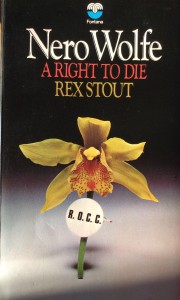
Ich weiß nicht, ob ich mich schon positiv über einen Krimi von Rex Stout geäußert habe. Wenn nein: Auch dieser Nero Wolfe-Roman hält sein gewohnt hohes, durchaus literarisches Niveau mit dynamischem Jazz-Age-Stil, guten Charakteren, spannendem Plot.
Was diesen Krimi besonders macht, ist, dass der Hauptverdächtige (und Klient von Wolfe und damit nicht der Täter) ein afro-amerikanischer Bürgerrechtler ist. Auf dem glatten Parkett der Beziehungen zwischen Weißen und Farbigen in den USA bewegt sich Rex Stout recht gewandt, ohne es sich immer einfach zu machen:
Out of eight people, at nine o‘ clock in the evening, you would expect at least two or three to be thirsty enough or bushed enough to want a drink, but they all said no. It couldn’t have been because of my manners, offering to serve people of an inferior race. First, two of them were white, and second, when I consider myself superior to anyone, as I frequently do, I need a better reason than his skin.
Oder:
„I’m going to tell you something my wife said the other day. We were discussing the trial (…) and we got to talking about you, and she said, ‚I wish he was a Negro‘.“ He smiled. „Now there’s a compliment.“
Wolfe grunted. „If I were, Mr Goodwin would have to be one too.“
Gelesen habe ich die englische Taschenbuchausgabe von 1974. Antiquarisch vielleicht zu bekommen ist eine deutschsprachige Ausgabe unter dem wie so oft eigenwilligen Titel „Wenn Licht ins Dunkle fällt“ aus dem Jahr 1967.